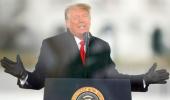Biden is best qualified to address the root cause of the polarisation in American politics before it turns into terminal malignancy, observes Ambassador M K Bhadrakumar.

In a poignant remark, German Foreign Minister Heiko Maas reacted to the dramatic events in Washington, DC, on Wednesday -- the storming of the Capitol building and President Donald Trump's attempted coup -- by recalling that Hitler's seizure of total power started with the burning of the Reichstag in 1933.
The apocalyptic imagery brings home how the outside world is looking at the United States.
It will take decades before American officials can talk to foreign countries about the importance of elections and peaceful transfer of power without the horror of Wednesday's event being thrown back at their face.
Without doubt, America has been fundamentally weakened on the international stage.
It has become a hopeless task to try to restore US deterrence and prestige.
Rival powers will see new vulnerability in the United States.
Even the US' firmest allies in Europe are wondering why they should place trust in the transatlantic alliance with NATO at its centre when American politics has become so febrile.
The general perception is that President Trump incited the 'insurrection', to borrow the expression used by President-Elect Joe Biden.
Chancellor Angela Merkel of Germany and Prime Minister Boris Johnson of Britain on Thursday also placed the blame squarely on Trump.
In a fit of anger and despair, the Democrats are demanding Trump's dismissal from the presidency.
Meanwhile, a glaring anomaly that caught the attention is the apparent ineptness of security agencies to prevent the mayhem in the Capitol building.
The very fact that the security forces could not prevent such an event taking place in the citadel of US democracy bears testimony to a dysfunctional system.
Equally, there is a deeply worrying angle to the scandalous failure of law enforcement.
Successive administrations since the 9/11 attacks have spent billions of dollars for strengthening homeland security.
But the amazing part is the passivity of the security forces deployed at Capitol Hill, which stands in sharp contrast with the massive show of force characteristic of the police's confrontation with protesters who agitate peacefully against racial injustice, war, and repression in America.

America has a history of the police empathising with white supremacist (external link) paramilitary groups.
Pictures suggest that at least some among the 2,000 uniformed personnel deployed at the Capitol building were really not interested in trying to stop the mob entering the building.
There is at least one controversial picture on the social media of policemen taking 'selfies' with the protestors.
Other pictures show officers literally opening the doors of the building for the pro-Trump protestors to enter.
To be sure, something is rotten in the state of Denmark.
There is indeed a backdrop pointing toward a serious malaise in the American political system, which the hype currently about the Democrats regaining control over the Senate after a gap of 6 years cannot hide.
The malaise goes far deeper than that and has everything to do with America's archaic electoral system and the great divide not only in the society as a whole but the polarisation within the two mainstream parties as well.
The faultlines have become too deep to be papered over and there is growing likelihood that the Republican and Democratic parties might split in a conceivable future, ending the two-party system itself.
America has become that dreaded divided republic that George Washington and his successor John Adams had warned about.
Washington in his farewell address had warned about the danger of 'hyper-partisanship' -- 'alternate domination of one faction over another, sharpened by the spirit of revenge' -- turning into a 'frightful despotism' at some point, while Adams had warned that 'a division of the republic into two great parties... is to be dreaded as the great political evil'.
The paradox is that if the two-party system in America survived thus far, it was because they weren't too far apart.
In fact, they stood for too little and operated largely as loose, big-tent coalitions of state and local parties.
It was a veritable four-party system with liberal Democrats and conservative Republicans co-habitating alongside liberal Republicans and conservative Democrats.

However, party politics has radically changed direction in the recent decades 'from a compromise-oriented squabble over government spending into a zero-sum moral conflict over national culture and identity', as Lee Drutman, author of Breaking the Two-Party Doom Loop: The Case for Multiparty Democracy in America, wrote (external link) recently.
In Drutman's words, 'As the conflict sharpened, the parties changed what they stood for. And as the parties changed, the conflict sharpened further. Liberal Republicans and conservative Democrats went extinct. The four-party system collapsed into just two parties.'
'The Democrats, the party of diversity and cosmopolitan values, came to dominate in cities but disappeared from the exurbs. And the Republicans, the party of traditional values and white, Christian identity, fled the cities and flourished in the exurbs. Partisan social bubbles began to grow, and congressional districts became more distinctly one party or the other. As a result, primaries, not general elections, determine the victor in many districts.'
The inevitable outcome has been that cross-partisan deal making has become extinct, there is no overlap between the two parties, and the system of separation of powers and checks and balances has given way.
The answer lies in multi-party democracy.
But there is a vicious cycle, what with the elections clause of the US constitution which leaves states to decide their own rules, and reserves to Congress the power to intervene, a power that Congress has used over the years to keep the two-party system in place and ensure that elections largely remain uncompetitive.
How could there be modern mass democracy without political parties?
Most advanced democracies have moved to proportional representation, supporting multi-party democracies, whereas the US electoral system and voting rules that were imported from Britain without debate in the 19th century remain frozen in time.

Multi-party democracy is not perfect, but it is far superior in supporting the diversity, bargaining, and compromise that is essential to self-government in a plural society like America.
The high levels of discontent and frustration manifest in the Capitol Riots ring alarm bells that the binary 'hyper-partisanship' (which Washington and Adams had warned about) spells doom for the future of American democracy.
If the gathering storms are to be pre-empted, a course of reform is imperative aimed at transforming America as a multiparty democracy.
As things stand, hyper-partisanship has intensified legislative gridlock and is leading to top-down leadership.
Congressional co-partisans have no incentive to check the president, since their electoral success is tied to his success and popularity.
On the other hand, Congressional opposition partisans have no incentive to work with the president, since their electoral success is tied to his failure and unpopularity.
The result is capitulation and/or stonewalling -- depending on where one stands in the polarisation.
In turn, the legislative gridlock means greater dependence on the judiciary to resolve issues, which of course has made supreme court appointments (especially with lifetime tenure) a high-stakes affair and has triggered nasty confirmation battles, and thus higher-stakes elections.
The nadir was reached when Trump pressured Georgia's secretary of state last Monday to overturn the 2020 election results.
Biden, a quintessential consensus maker who has described himself as a 'transitional president;, is best qualified to address the root cause of the polarisation in American politics before it turns into terminal malignancy.
The Europeans understand from their own history that the deeply-flawed American variant of democracy can no longer represent and engage diffuse citizens, bringing them together for a common purpose, and politics is turning increasingly chaotic and despotic, and citizens and politicians feel threatened by executive overreach.
German Foreign Minister Maas' remark touches a raw nerve, but the future of American democracy may well depend on paying heed to Germany's tragic history.
The Capitol Riots may turn out to be the canary in the political mine -- a cautionary tale.
Ambassador M K Bhadrakumar, who served the Indian Foreign Service for more than 29 years, is a frequent contributor to <em<>Redif.com.
Feature Presentation: Aslam Hunani/Rediff.com










